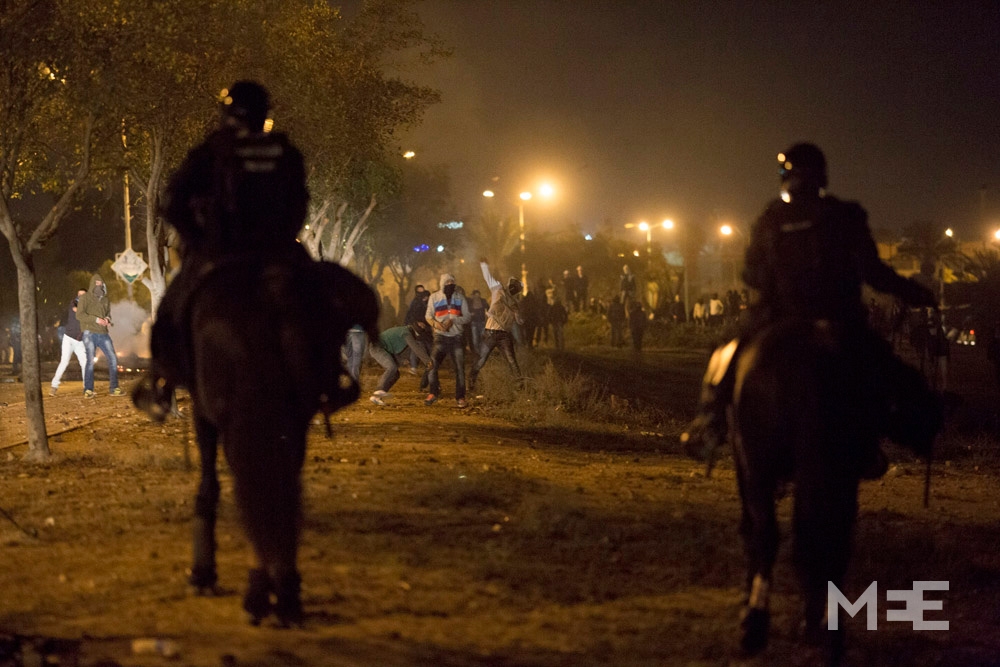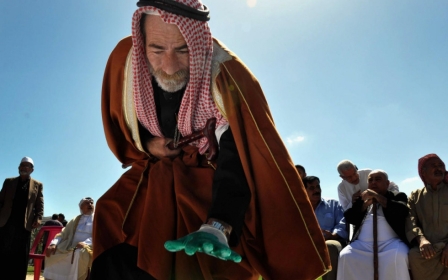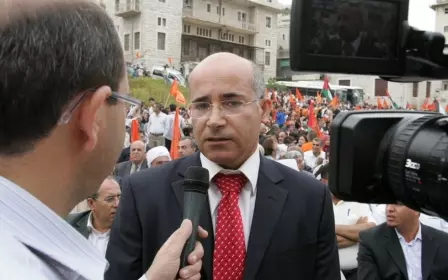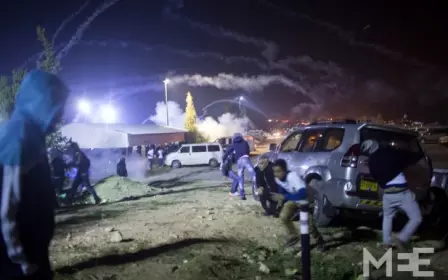Israeli police violence in spotlight amid deaths and mass protests

RAHAT, Israel - The Bedouin city of Rahat in southern Israel has been gripped by violence over the last week, after two residents were killed and at least a dozen others injured during police operations aimed at quelling growing unrest.
As the population of the Naqab (Negev) region continued to mourn the two deaths on Tuesday, tensions spread across Israel and the occupied West Bank, where protests were held over perceived police brutality.
While the Bedouin make up a minority of the Palestinian population within Israel, recent events have resonated with a majority of Palestinian citizens of Israel, who make up about 20 percent of Israel’s overall population.
Activists held marches in several cities across Israel and West Bank, including in Haifa, Nazareth and Ramallah.
Protesters took to the streets in solidarity with Rahat residents, demanding the authorities do more to stamp out heavy-handed police tactics that they say disproportionately target Palestinian citizens of Israel, as well as Palestinians living in the West Bank.
Arab stores and businesses shut their doors, as Palestinian citizens staged a nationwide walk-out that also closed some schools.
The recent escalation began last week when 22-year-old Sami al-Ja’ar was shot in the stomach outside his home in Rahat. The incident, Israeli police said, occurred during a drug-related operation, but when Ja'ar died from his injuries in hospital, the local population responded with anger, blaming the police for his killing.
Thousands attended his funeral on Sunday, which turned into a scene for further violence.
When police officers entered the cemetery where al-Ja'ar was to be buried, they were reportedly pelted with stones and firecrackers to which they responded by firing tear gas and rubber-coated bullets.
A 47-year-old Bedouin man, Sami al-Zayadna, died from tear-gas inhalation, while some 25 others, including two police officers, were treated for injuries sustained during the incident.
Anger boiling in Palestinian communities
In Rahat, more than 2,000 Bedouin took part in a candlelight march to the homes of the two men killed, although later in the evening around 300 youth clashes with Israeli police in the entrance of the city. Five youth were arrested.
“There is a very high level of anger and depression among people,” Khalil al-Amour, a researcher with Adalah, the Legal Centre for Arab Minority Rights in Israel, told Middle East Eye from Rahat. “They feel they can’t express their views, and what they want. To express what we want, we have to put ourselves in danger – as the last few days have shown.”
Israeli police spokesman Micky Rosenfeld told MEE that an investigation into Ja’ar’s death was ongoing, but stressed that police did not bear responsibility for Zayadna’s death.
“After the funeral there were disturbances, a police vehicle was surrounded, and the crowd was dispersed,” Rosenfeld said. “It is important to emphasise that the second man passed away because of a heart condition, not due to any of the actions of the police or the non-lethal crowd control measures that the police use."
Rosenfeld said that the police was focusing on maintaining calm in Rahat by speaking to local leaders. “In general we have a strong police presence in the area, when it comes to general patrolling and so on. And where there are no incidents we have a good relationship. What’s most important is that we can contain the unrest to stop it spreading to the wider Arab communities.”
History of discrimination and violence
The people of Rahat though have expressed fury at police behaviour in recent days, while also pointing to what they say is a well-documented history of discrimination, and racial and religious profiling.
In recent years, Palestinians in Israel have been the target of several pieces of legislation, pushed forward by Israeli Prime Minister Benjamin Netanyahu, that they argue are intended to further disenfranchise their community. One of these is the controversial Jewish State bill, which legally defines Israel as the home of the Jewish people.
Ja'ar and Zaydana are the 49th and 50th Palestinian citizens of Israel to be killed by Israeli police since 2000.
Their deaths follow the high-profile killing of Kheir Hamdan, who was shot dead by police for allegedly banging on a police van in northern Israel in November. While police said they fired in self-defence, leaked video footage showed Hamdan running from police when they shot him.
Ja'ar's father, who previously served in the Israeli police force, said his son's death has undermined his faith in the authorities.
“I am sorry I served the state,” Khaled al-Ja’ar told The Times of Israel. “I am telling Bibi Netanyahu and everyone — I am sorry I served in the Israel Police, Border Police. I regret it today. I am saying this to everyone Bedouin and Arab who volunteers today — let him think a million times before he goes. To them I say, if my son was murdered, what will happen to them tomorrow? What will they do to them?”
At Tuesday’s protest, demonstrators wore t-shirts that read “Kulna Sami” – We are all Sami – and carried posters depeicting Ja’ar’s photograph.
Hala Marshood, a 22-year-old Palestinian student from Jerusalem’s Hebrew University, said the deaths in the Naqab had mobilised Palestinians.
“There has clearly been an escalation, because what has happened has been unforgivable,” she said. “We want to show people how anti-democratic this state is, and to expose its systematic policy against Arabs.”
October 2000 killings
October 2000 marked the most notorious instance of Israeli police violence against Palestinian citizens of the state.
Coinciding with the beginning of the Second Intifada, 13 Palestinian citizens of Israel were shot by Israeli police using live ammunition during a series of protests in northern Israel.
The killings - which prompted angry responses from Palestinians across the country and led to more protests - led the Israeli government to set up the Orr Commission to investigate. The commission eventually ruled that while blame could be placed on Palestinian and Jewish leaders, serious problems existed in how Israeli police dealt with the country's Palestinian minority.
The report condemned the police’s use of crowd-control weapons, including the use of rubber-coated bullets, and argued that the force had failed to adequately train police officers to handle riots and protests.
As well as criticising the authorities’ handling of unrest, however, the commission also highlighted profound inequalities in the treatment of Arab citizens more generally.
“Government handling of the Arab sector has been primarily neglectful and discriminatory,” the report said, adding that the Israeli state had fallen short of showing sensitivity to the needs of the Arab population, which experienced deep inequality and had trouble accessing state services and national resources.
'The lesson wasn't learned'
Fifteen years later, many of those living in Rahat and the surrounding towns do not believe that Israel has done anything to address these issiues.
“The general feeling people have is that they aren’t safe. They believe that they can be killed in any way, anywhere, and that they’re not protected,” said Adalah’s Khalil al-Amour, who is from an unrecognised Bedouin village in the Naqab.
“It is easy to kill us and easy to hurt us. People feel that their blood is cheaper than Jews’ blood. They see that no one will investigate the police, that the police are seen as perfect and unable to do anything wrong. People think that the police are just doing their job, which includes killing us.”
Amour said the mood in the Naqab and across the Palestinian community is pessimistic, and residents see little hope that they will change government policy.
“What happened hasn’t been forgotten. In 15 years we’ve lost 50 people. It’s miserable, crazy. In the only democracy in the Middle East, and nobody asks why?” Amour said. "The lesson from 2000 wasn’t learned.”
Bethan Staton reported from Jerusalem, while Oren Ziv contributed additional reporting from Rahat.
New MEE newsletter: Jerusalem Dispatch
Sign up to get the latest insights and analysis on Israel-Palestine, alongside Turkey Unpacked and other MEE newsletters
Middle East Eye delivers independent and unrivalled coverage and analysis of the Middle East, North Africa and beyond. To learn more about republishing this content and the associated fees, please fill out this form. More about MEE can be found here.




